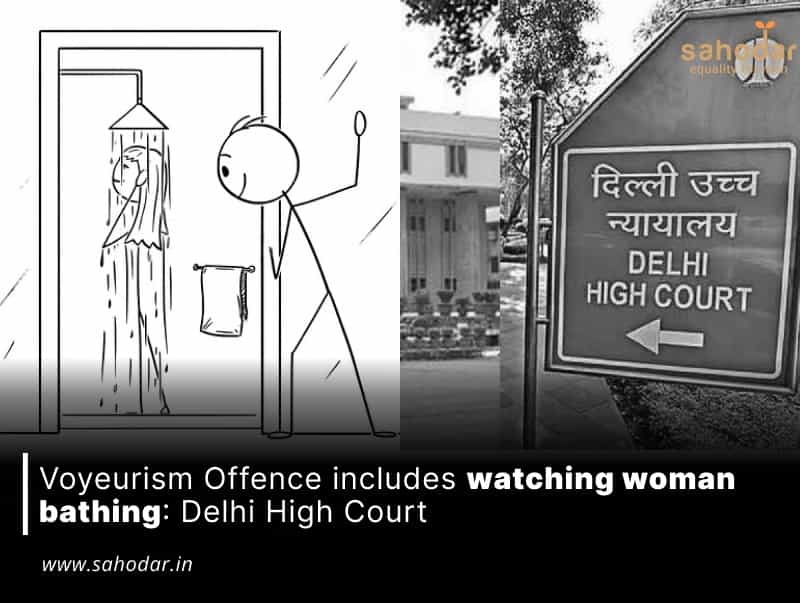The Delhi High Court has stated that when a man peeks inside a washroom while a woman is bathing, it constitutes an invasion of her privacy and also amounts to the offence of voyeurism.
Justice Swarana Kanta Sharma has explained that bathing in a bathroom, regardless of gender, is a private act taking place within the confines of the bathroom’s four walls.
The court affirmed that a woman who is taking a bath inside a closed bathroom would naturally assume that her privacy is not being intruded upon and that nobody is watching her while she is behind closed walls and a curtain. Therefore, if a person peeks into the bathroom, it is undoubtedly a violation of her privacy.
The court upheld the conviction of a man under section 354C of the Indian Penal Code and sentenced him to one year of rigorous imprisonment for peeping into a washroom located outside a jhuggi in 2021. However, the court set aside his conviction under section 12 of the POCSO Act because the prosecution was unable to prove that the victim was under 18 years of age at the time of the incident.
The court mentioned that the victim was attending college at the relevant time and that, according to the statement of a prosecution witness, she was approximately 17 years old on the day of the incident. The court further stated that the school certificate only mentions the date of adoption and not the date of birth, and the trial court erred in relying on the date of birth, which was based on assumptions according to the victim’s parents’ admission.
Thus, the court affirmed the conviction of the accused under section 354C of the Indian Penal Code for invading the privacy of a woman, but it set aside the conviction under the POCSO Act because the age of the victim could not be established as being under 18 years.
Justice Sharma emphasized that the social context of crimes must be taken into account, particularly in cases where the victim, due to poverty, does not have the luxury of having a bathroom inside her home and must use a makeshift bathroom located outside.
The court pointed out that the defendant’s act of peeping inside the bathroom, which only had a curtain instead of a door, constitutes an offence under Section 354C of the Indian Penal Code. The act puts women in a state of distress and constant fear of being observed while bathing, even when they are in a makeshift bathroom behind closed walls.
Therefore, the court stressed that it is essential to be mindful of the social realities of such cases and the plight of impoverished individuals while delivering justice.
The court examined explanation 1 to section 354C and concluded that it encompasses acts of voyeurism where the perpetrator watches a woman engaged in a private act in a place where she can reasonably expect privacy, and where her breasts, genitals, or posterior are exposed or covered only by underwear. Such acts would include a scenario where the victim is using a restroom or engaging in a sexual act that is not ordinarily done in public, and she has a reasonable expectation of privacy.
The court further stated that the definition of voyeurism also covers instances where the victim consents to the capturing of images but does not permit their dissemination to third parties. Thus, the court emphasized the importance of respecting a person’s privacy, especially in situations where they have a reasonable expectation of privacy, and called for appropriate action against the perpetrators who invade a person’s privacy.
The appellant’s counsel argued that the act of peeping inside a washroom situated at a common public place cannot be considered a private act. However, the court dismissed this argument, calling it meritless and absurd.
The court reiterated that the objective behind introducing the offence of voyeurism was to curb sexual crimes against women and to protect their privacy and sexual integrity. The court emphasized the importance of respecting every person’s sexual integrity and privacy and stated that any violation of the same must be dealt with sternly.
The court underlined that the law must ensure that every citizen can lead a peaceful life with the assurance that their privacy is respected, and that trespassing and similar mischief will attract the criminality of voyeuristic behavior. Therefore, the court concluded that the act of peeping inside a washroom during a private act would amount to invasion of privacy and attract criminal charges under section 354C of the Indian Penal Code.
The court dismissed the appellant’s argument that upholding the conviction would lead to people being prosecuted for merely being present at public places like religious sites, holy rivers, and swimming pools where women may be bathing. The court made it clear that taking a dip at a holy place cannot be compared to a closed bathroom where a woman is taking a bath. However, the court emphasized that there is a reasonable expectation that photographs or videos of such women are not taken, even in those situations. The court emphasized that even in such cases, taking photographs or videos would be an invasion of privacy and would be punishable under Section 354C of the IPC and its Explanation.
Source: https://www.livelaw.in/news-updates/delhi-high-court-peeping-washroom-woman-bath-privacy-voyeurism-225698

